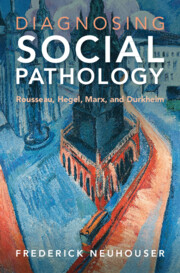Book contents
- Diagnosing Social Pathology
- Diagnosing Social Pathology
- Copyright page
- Dedication
- Contents
- Preface
- Note on Citations
- Chapter 1 Can Societies Be Ill?
- Chapter 2 Society as Organism?
- Chapter 3 Marx: Pathologies of Capitalist Society
- Chapter 4 Marx: Labor in Spiritual Life and Social Pathology
- Chapter 5 Plato: Human Society as Organism
- Chapter 6 Rousseau: Human Society as Artificial
- Chapter 7 Durkheim’s Predecessors: Comte and Spencer
- Chapter 8 Durkheim: Functionalism
- Chapter 9 Durkheim: Solidarity, Moral Facts, and Social Pathology
- Chapter 10 Durkheim: A Science of Morality
- Chapter 11 Hegelian Social Ontology I: Objective Spirit
- Chapter 12 Hegelian Social Ontology II: The Living Good
- Chapter 13 Hegelian Social Pathology
- Chapter 14 Conclusion: On Social Ontology
- Bibliography
- Index
Chapter 3 - Marx: Pathologies of Capitalist Society
Published online by Cambridge University Press: 07 October 2022
- Diagnosing Social Pathology
- Diagnosing Social Pathology
- Copyright page
- Dedication
- Contents
- Preface
- Note on Citations
- Chapter 1 Can Societies Be Ill?
- Chapter 2 Society as Organism?
- Chapter 3 Marx: Pathologies of Capitalist Society
- Chapter 4 Marx: Labor in Spiritual Life and Social Pathology
- Chapter 5 Plato: Human Society as Organism
- Chapter 6 Rousseau: Human Society as Artificial
- Chapter 7 Durkheim’s Predecessors: Comte and Spencer
- Chapter 8 Durkheim: Functionalism
- Chapter 9 Durkheim: Solidarity, Moral Facts, and Social Pathology
- Chapter 10 Durkheim: A Science of Morality
- Chapter 11 Hegelian Social Ontology I: Objective Spirit
- Chapter 12 Hegelian Social Ontology II: The Living Good
- Chapter 13 Hegelian Social Pathology
- Chapter 14 Conclusion: On Social Ontology
- Bibliography
- Index
Summary
Chapter 3 examines some problems Marx takes to be inherent in capitalism that can be regarded as social pathologies, clarifying how dysfunction must be understood if his most sophisticated critiques are to be grasped. It focuses on forms of social pathology bound up with Marx's account of the formula for the circulation of capital, which distinguishes capital from mere money in terms of the function of each. Marx's biological language makes it plausible to interpret the dysfunctions of capitalism as pathologies: for example, its cancer-like growth that ignores the needs of producers. Yet these dysfunctions cannot be grasped without taking into account the spiritual aspects of human social being. Marx regards social life as spiritual – as informed by the aspiration to unite the ends of life with those of freedom in one's social activity – and capitalism's failure to allow for this unity as its principal defect.
Keywords
- Type
- Chapter
- Information
- Diagnosing Social PathologyRousseau, Hegel, Marx, and Durkheim, pp. 45 - 71Publisher: Cambridge University PressPrint publication year: 2022

